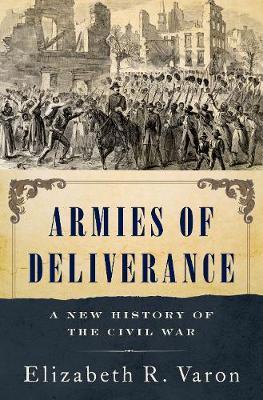Armies of Deliverance

Armies of Deliverance
slavery was the obstacle to national reunion and that emancipation would secure military victory and benefit Northern and Southern whites alike. To sustain their morale, Northerners played up evidence of white Southern Unionism, of antislavery progress in the slaveholding border states, and of disaffection
among Confederates. But the Union's emphasis on Southern deliverance served, ironically, not only to galvanize loyal Amer icans but also to galvanize disloyal ones. Confederates, fighting to establish an independent slaveholding republic, scorned the Northern promise of liberation and argued that the emancipation of blacks was synonymous with the subjugation of the white South.
Interweaving military strategy, political decision-making, popular culture, and private reflections, Varon shows that contests over war aims took place at every level of society within the Union and Confederacy. Everyday acts on the ground-scenes of slave flight, of relief efforts to alleviate suffering, of protests against the draft, of armies plundering civilian homes, of civilian defiance of military occupation, of violence between neighbors, of communities mourning the
fallen-reverberated at the highest levels of governance. In this book, major battles receive extensive treatment, providing windows into how soldiers and civilians alike coped with physical and emotional toll of the war, as it escalated into a massive humanitarian crisis. Although the Union's politics of deliverance
helped to bring military victory, such appeals ultimately failed to convince Confederates to accept peace on the victor's terms.
PRP: 254.14 Lei
Acesta este Prețul Recomandat de Producător. Prețul de vânzare al produsului este afișat mai jos.
228.73Lei
228.73Lei
254.14 LeiLivrare in 2-4 saptamani
Descrierea produsului
slavery was the obstacle to national reunion and that emancipation would secure military victory and benefit Northern and Southern whites alike. To sustain their morale, Northerners played up evidence of white Southern Unionism, of antislavery progress in the slaveholding border states, and of disaffection
among Confederates. But the Union's emphasis on Southern deliverance served, ironically, not only to galvanize loyal Amer icans but also to galvanize disloyal ones. Confederates, fighting to establish an independent slaveholding republic, scorned the Northern promise of liberation and argued that the emancipation of blacks was synonymous with the subjugation of the white South.
Interweaving military strategy, political decision-making, popular culture, and private reflections, Varon shows that contests over war aims took place at every level of society within the Union and Confederacy. Everyday acts on the ground-scenes of slave flight, of relief efforts to alleviate suffering, of protests against the draft, of armies plundering civilian homes, of civilian defiance of military occupation, of violence between neighbors, of communities mourning the
fallen-reverberated at the highest levels of governance. In this book, major battles receive extensive treatment, providing windows into how soldiers and civilians alike coped with physical and emotional toll of the war, as it escalated into a massive humanitarian crisis. Although the Union's politics of deliverance
helped to bring military victory, such appeals ultimately failed to convince Confederates to accept peace on the victor's terms.
Detaliile produsului











